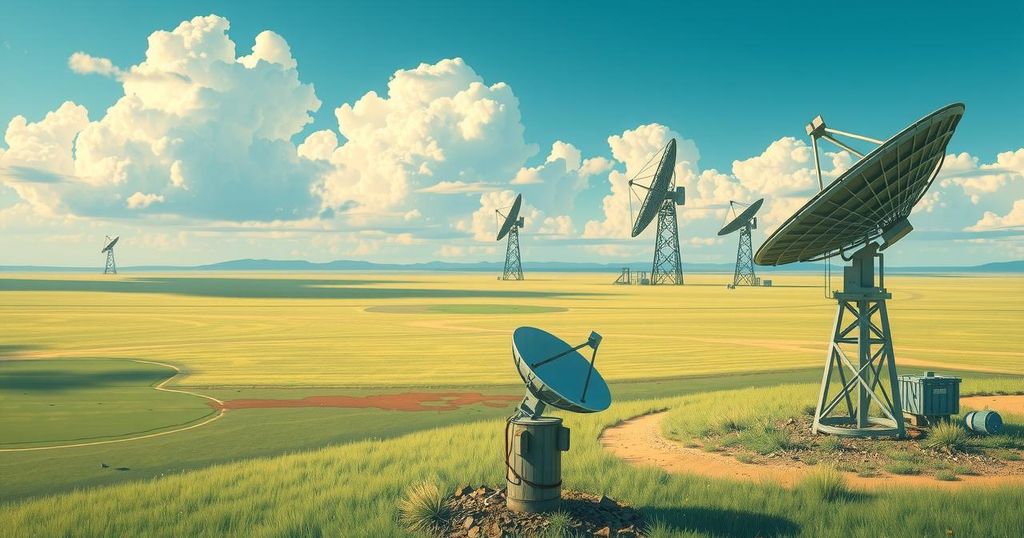Elon Musk’s Starlink faces operational barriers in South Africa due to black empowerment laws requiring 30% local ownership. Despite Musk’s claims of racial bias, officials assert Starlink has not applied for a license. Minister Solly Malatsi seeks to ease these regulations, but political resistance persists from ANC lawmakers. Starlink’s licensing issues underscore broader tensions between U.S. interests and South African policy frameworks.
The conflict between Mr. Elon Musk and South Africa regarding the launch of Starlink is rooted in the nation’s black empowerment laws. Mr. Musk stated on his social media platform, X, that Starlink was “not allowed to operate in South Africa simply because I’m not black,” suggesting racial discrimination was a barrier. However, the Independent Communications Authority of South Africa (Icasa) clarified that Starlink has not yet applied for the necessary operating license.
To begin operations in South Africa, Starlink must obtain both network and service licenses that mandate a 30% ownership stake held by historically disadvantaged groups. These laws aim to promote economic participation among South Africa’s majority black population, which faced systemic exclusion under apartheid. The African National Congress (ANC), which has governed since the end of apartheid in 1994, emphasizes such legislative measures as vital for addressing past injustices.
Mr. Musk, originally from South Africa, perceives these ownership requirements as significant obstacles to Starlink’s operations. According to a statement submitted to Icasa, he argued that the black empowerment legislation restricts many foreign satellite suppliers from entering the South African market. However, Clayson Monyela, a spokesperson from the foreign ministry, disputed this by highlighting that over 600 U.S. firms successfully operate within South Africa under the existing legal framework.
Efforts to alleviate the regulatory barriers have emerged, notably with support from South Africa’s Communications Minister Solly Malatsi, who is affiliated with the Democratic Alliance (DA). This party is critical of the current black empowerment laws, arguing they contribute to corruption. Minister Malatsi indicated intentions to issue a policy directive to Icasa aimed at potentially easing the ownership stipulations.
Despite these discussions, progress has stalled. Minister Malatsi’s efforts to alter the black equity requirement face resistance from ANC supporters within the parliamentary sector. Khusela Diko, the chairperson of the parliamentary communications committee, firmly asserted that existing transformation measures are non-negotiable and emphasized that any circumvention of the law would not be entertained.
The relationship between South Africa and the U.S. has been strained during former President Donald Trump’s administration. Mr. Musk’s criticisms of South African laws have echoed Trump’s sentiments, particularly regarding property rights and racial issues. Allegations concerning the mistreatment of white farmers and land confiscation have been dismissed by critics as unfounded, yet are leveraged by Musk to articulate his frustrations about Starlink’s licensing.
Despite an initial positive engagement with President Cyril Ramaphosa, it appears Mr. Musk’s stance has shifted towards alignment with right-wing sentiments. Meanwhile, Starlink has experienced varying regulatory success across Africa, including a recent 10-year license from Lesotho amid U.S. trade pressures, though concerns about local ownership persist. The company is also navigating strict ownership laws in Namibia.
Starlink’s vision aims to deliver affordable internet services across underserved regions, positioning itself as a crucial player for nations like Somalia and Nigeria, where it has gained operational licenses. However, its absence in South Africa remains notable, particularly in light of a significant portion of the population lacking internet access. Future negotiations may provide an opportunity for collaboration that could benefit both Starlink and the South African government in achieving internet connectivity goals.
The dispute between Elon Musk regarding the operation of Starlink in South Africa highlights complex issues surrounding race, economic empowerment, and regulatory compliance. Although Musk’s claims of racial discrimination have received considerable attention, the core challenge lies within South African laws requiring foreign operators to engage with local black ownership. Minister Solly Malatsi’s proposed policy changes have yet to yield results amidst political resistance. As Starlink seeks to expand its presence across Africa, its future in South Africa remains uncertain, with significant implications for connectivity and economic collaboration.
Original Source: www.bbc.com




